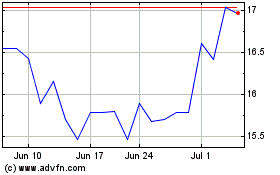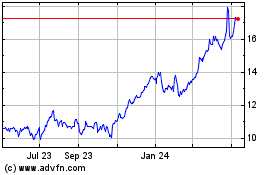By Jenny Strasburg, Bojan Pancevski and Ben Dummett
The German government is prepared to back a potential merger of
Deutsche Bank AG and rival Commerzbank AG to create a national
banking giant, responding to deep skepticism among shareholders,
clients and others about the health of the two banks.
A senior German regulator told The Wall Street Journal in recent
weeks that he had reviewed and unofficially endorsed plans to merge
the two banks. He said the initiative was driven by the country's
finance minister, Olaf Scholz, and his Social Democratic Party.
"This is a decision about industrial policy and it has to be
made by politicians," he said.
The regulator added that Chancellor Angela Merkel's
conservatives, who govern as a senior partner in a coalition with
Mr. Scholz's Social Democrats, have also accepted the idea of a
merger, according to discussions he had with conservative
politicians.
A spokeswoman for the conservatives didn't respond to a request
for comment. A spokesman for Mr. Scholz didn't respond to a request
for comment.
Recently, a person close to Cerberus Capital Management LP, a
top investor in both Deutsche Bank and Commerzbank, said executives
have indicated it wouldn't stand in the way if Berlin decides it
backs a merger. A Cerberus spokesman declined to comment. Cerberus
had last year told investors and others that Germany was a big
enough market for both banks and it wasn't pushing for a
merger.
This growing acceptance within the political establishment and
among some investors of a merger means the country's two biggest
banks may not fully control their own fates much longer.
Deutsche Bank executives, buffeted on multiple fronts, could be
pushed toward the merger, which they've been resisting, before
summer, according to investors, government officials and others
close to the lender.
Like its bigger rival, Commerzbank has struggled to restructure
and make money on a pace to win over investors. Its shares fell 54%
last year, compared with Deutsche Bank's 56% decline.
Deutsche Bank Chief Executive Christian Sewing, nine months into
the job, has told clients, investors and regulators he wants more
time -- ideally the rest of this year -- to fix the bank's cost and
profitability problems before seriously contemplating a tie-up.
Publicly, he has said he is focused on the bank's long-term,
stand-alone strategy. Prominent investors have backed the
wait-and-see stance.
Some people involved in contingency planning in Berlin,
Frankfurt and elsewhere say Mr. Sewing and his team have the rest
of the first quarter to steady the bank's performance and boost
confidence among investors who've driven the bank's shares to
record lows.
Worries over government investigations in the U.S. and Germany
into Deutsche Bank's business have helped send its funding costs
higher and created jitters among clients. If progress is lacking,
the momentum behind a merger will pick up, they say. They say
that's the most likely option for dramatically reshaping Deutsche
Bank.
This Friday in Frankfurt, Deutsche Bank is expected to report
2018 results headlined by the lender's first annual posttax profit
since 2014.
Executives have said they are on track to meet that goal.
Investors, meanwhile, will be looking ahead, especially for clues
about underlying 2019 trends in key areas like fixed-income trading
and transaction banking. Any sign the bank is caving on its
already-modest financial targets -- such as 2019 costs, revenues,
or return on equity -- would be unsettling. There's no indication
those targets are changing.
Deutsche Bank and Commerzbank have discussed a potential deal
periodically over the past three years but without reaching an
agreement, people close to the lenders say.
Creating one large German bank out of two ailing ones would
dovetail with a government philosophy behind fostering so-called
European champions to counter the growing power of U.S. and Chinese
institutions, senior government officials said.
The conclusion among top government authorities, the German
regulator said, has been that the impact of a big-bank merger on
the stability of the German financial system would be manageable.
Others caution that thousands of job cuts would be necessary to
shed enough costs for a combined Deutsche-Commerzbank to make
sense, meaning fights with labor unions.
The government, besides its interest in the stability of the
German banking system, owns about 15% of Commerzbank shares as a
result of a crisis-era bailout. That stake could give German
taxpayers a roughly 5% stake in a combined Deutsche-Commerzbank,
analysts and government officials say. Some inside the government
believe it could comfortably sell down that stake over time.
One potential investor eyeing a new stake in the bank is
Qatari's sovereign-wealth fund, the Qatar Investment Authority,
according to a person close to Deutsche Bank. The discussions were
earlier reported by Bloomberg. It is unclear what size stake the
QIA is considering, which would be in addition to a roughly 6%
shareholding by separate Qatari-controlled vehicles. The QIA didn't
immediately respond to requests for comment.
Write to Jenny Strasburg at jenny.strasburg@wsj.com, Bojan
Pancevski at bojan.pancevski@wsj.com and Ben Dummett at
ben.dummett@wsj.com
(END) Dow Jones Newswires
January 31, 2019 07:27 ET (12:27 GMT)
Copyright (c) 2019 Dow Jones & Company, Inc.
Deutsche Bank Aktiengese... (NYSE:DB)
Historical Stock Chart
From Mar 2024 to Apr 2024

Deutsche Bank Aktiengese... (NYSE:DB)
Historical Stock Chart
From Apr 2023 to Apr 2024
